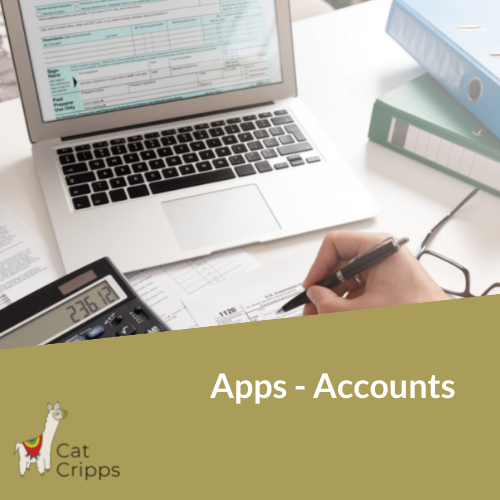I am continually being asked “which app should i use in my business for X” and so I thought it would be useful to review different types of software and how they can be used in your business. Bear in mind that what suits one business may not be right for yours.
The topics over the next four weeks will cover:
1. Accounting
2. CRM (Customer Relationship Management)
3. Project management / productivity / collaboration tools
4. Appointments / calendars
So this week – accounting apps. This is not to favour any one product over others – it’s more to give you an idea of the reasons why it might be a good idea to use one!
What are accounting apps used for (these are the basics for a small business):
• Tracking sales – invoicing and sales receipts
• Tracking and recording expenditure
Your accountant will probably do more especially when it comes to annual accounts, corporation tax returns or your SA tax return.
Sales – if you need to issue invoices, then technically these can be done using Word, or Excel (or equivalents). The advantages are – you are familiar with these, disadvantages are – you may make errors. You might reuse an invoice number or you might calculate totals or VAT incorrectly (esp in Word), but you also have to copy and paste customer details (or even type them in each time).
If you create a customer record in an accounts package then you can use the details time and again without retyping, the invoice number will always be correct as will the VAT and totals. You also then have a record and can chase debt, send statements etc., and record the money when it comes in. This keeps everything all in one place – and you won’t forget to get the money in (or at least it is more difficult to forget – and yes some small businesses are really bad at chasing their money).
Expenditure – It’s the same deal really – supplier details are held and you can simply record monthly outgoings easily. Most packages will sync with a bank feed so you don’t even have to type the invoice or receipt info in – and you can scan receipts with your phone! You Do Not have to keep paper copies any longer. (UK – check your own tax requirements).
There may be additional benefits, such as keeping costs down with your accountant as they will have to do less work! And if your business has other needs you might want a package with Stock control, or Purchase Orders for example – to really get things under control.
Some possible candidates include:
• Xero
• Quickbooks
• Sage Cloud Accounting (NOT the same as Sage 50 Cloud)
• FreeAgent
If you have other apps or packages you like to use in your business (e.g. CRM – see next topic) then check out which of the above your app will link to, and there might be a software app for your industry so make sure they connect! You might want to integrate to your website (stock management) or your payment facility for example.
You may see an option to get “three months free” – bear in mind once set up it’s hard to move to another system! They know this! Do by all means take a free trial, it’s important to make sure that the software will do everything you need it to do, so make a list before you start of the features and benefits you will require.
Do talk to your accountant before making a decision, as you don’t want to end up using a system they cannot support. It is your business, however, so if there is a good reason for you to use a particular package (due to integrations with other software), then do not be deterred. Timing can be everything too – especially if you are VAT registered – or if you want to fall in line with your year end / tax year end.
Take some time to consider your requirements for your business and remember that it will take time and effort to get a new system embedded. Make sure you take advice, and set aside time for training too.
You may find this useful – a link to what should be on an invoice (UK)
https://www.freeagent.com/guides/invoicing/tips-vat-invoice
Get in touch if you would like to discuss further.
